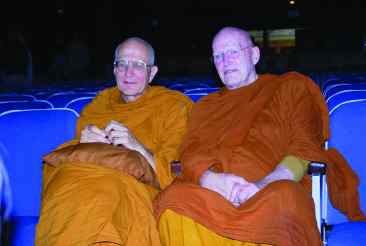
Seating was limited at Perth & District Collegiate Institute’s Auditorium on Sunday, June 6, as Buddhist monk Ajahn Sumedho spoke at length on the eastern religion, Buddhism. Sumedho, who has been practicing Buddhism for over 40 years, is currently serving as Abbot to the Amaravati Buddhist Monastery, in Hertfordshire, England, and is on a visit to Perth as a guest of the Tisarana Monastery, near Perth. (…)
According to Sumedho, Buddhism, literally translated, means « awakened consciousness, » and has only recently begun to take root in the West.
« In the past 15 years there has been a noticeable growth in Buddhism in the Western World, » Sumedho stated, before noting that there is a lot more information available about Buddhism than there was when he first encountered it, in the 1960s. « It was very difficult then to find any kind of Buddhist literature in English. »
Born in the United States, Sumedho was drawn to Buddhism from a relatively young age. While working towards two degrees at Berkley in California, Sumedho became involved in various peace movements, and began to realize that although he was trying to achieve peace, he was not at peace himself. This led him to take an interest in meditation and Buddhism.
His burgeoning interest in Buddhism drew him to the Peace Corps in 1963, which took him to South East Asia, and North Borneo. Through the Peace Corps, Sumedho became aware of Theravada Buddhism, one of the strictest forms of Buddhism, and after completing his Peace Corps contract, he continued on to study in Thailand, where more than 95 per cent of the populace is Buddhist.
« I intended to be a monk for two years, but now this is my forty-fourth year, » Sumedho laughed.
In 1967, Sumedho started meditating in Bangkok, but found it too busy, and traveled on to North East Thailand, where he stayed with a teacher in a forest monastery. Sumedho explained that it is the continuation of the forest monasteries that led to the founding of Tisarana, in Perth.
« Why would we be establishing a monastery in Perth? » Sumedho asked, « It’s a part of the forest tradition of living close to nature. »
While in Thailand, Sumedho trained for 10 years with the famous Thai meditation master, The Venerable Ajahn Chah. There, he learned how « out of ignorance, out of not understanding, out of force of habit…how we create conflict in our minds. »
Meditation, Sumedho explained, is a word that covers almost any form of mental exercise. In terms of Buddhist meditation it has a certain style to it – looking into and observing oneself. « The ability to recognize our own mental and physical states is the essence of Buddhism, » Sumedho said.
Sumedho practices the form of meditation called « Vipassana », which he describes as « involving insight practices and observing ourselves. »
Sumedho describes living for the past thirty-three years in England – a non-Buddhist country – as « a profound experience », and explained that although it may seem like monks are only concerned with their own peaceful mind, that is not the case, that they are also concerned with the world around them.
Issues such as climate change, environmental concerns are of concern to everyone, Sumedho stated, before going on to describe the oil spill in the Gulf of Mexico as « a result of greed, hatred, and our need for things. »
It is the need for « things » that Sumedho feels is one of the conflicts humans face. « Much of our life in the modern world is about seeking happiness, comfort and security…in Buddhism, we are changing from a human individual running away from suffering to recognizing and accepting. »
He went on to add that: « No matter what the government tries to provide us with, there is nothing external that can give us inner peace…that’s something we have to find for ourselves. »
Ajahn Sumedho will be staying at the Tisarana Monastery in Stanleyville until June 18.
Source: emcperth.ca




